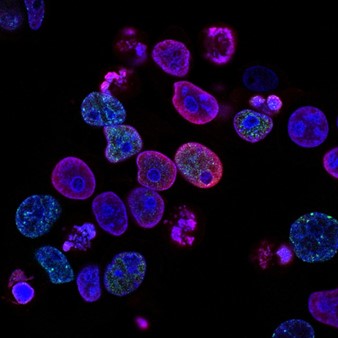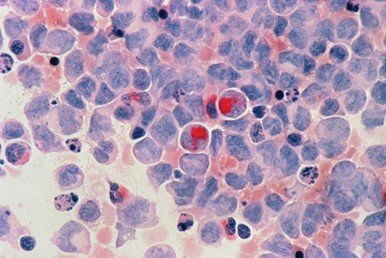Alice C. Chang Ph.D. is a Professor of Biochemistry and Molecular Biology at CMU. In the following lecture review, Alice C. Chang explains the connection between metabolism and cancer, unveiling its profound implications for treatment. From understanding the fundamental interplay to the latest scientific discoveries and groundbreaking therapies, this article provides an extensive look into the world of metabolic processes and their impact on one of humanity’s most significant health challenges.
Cancer is a formidable adversary that has plagued humanity for centuries. While our understanding of the disease has grown exponentially in recent years, there is yet one aspect of cancer that continues to intrigue and captivate researchers: the intricate relationship between it and metabolism.
Alice C. Chang Ph.D. Describes the Relationship Between Cancer and Metabolism
To truly appreciate the implications of metabolic links to cancer, we must first understand the basics. Metabolism, the complex network of chemical reactions in our cells that transforms nutrients into energy, is a core component of the foundation of life. However, when these processes go awry, it can lead to abnormal cell growth, a defining characteristic of cancer.
Alice C. Chang Ph.D. explains that the relationship between metabolism and cancer is currently a topic of profound significance in the field of oncology. Understanding how metabolism influences cancer development and progression is essential for the advancement of treatment strategies.
In particular, the Warburg effect, a phenomenon wherein cancer cells exhibit altered metabolic behaviors, has garnered considerable attention. This metabolic shift not only provides insights into the distinctive characteristics of cancer cells, but also presents opportunities for novel therapeutic interventions.
The Role of Metabolism and the Development of Cancer
The growth and progression of cancer cells rely on various nutrient and energy availabilities which could constitute metabolic vulnerabilities. Alice C. Chang Ph.D. says that this could affect their survival within the tumor microenvironment, making the study of metabolism and tumor progression an area of great interest.
For example, in prostate cancer, The Androgen receptor (AR) has been found to regulate several metabolic pathways, which include:
- Glucose uptake
- Glycolysis
- The TCA cycle
- Mitochondrial biogenesis and respiration
- Lipid synthesis and oxidation
Alice C. Chang Ph.D. underscores the critical impact of this regulation on cancer stem cells, shedding light on the pivotal role of metabolic reprogramming in cancer progression.
It is hypothesized that targeting metabolic pathways may be a potential approach to cancer treatment. Furthermore, metabolic profiling may be used to customize treatment plans, as well as identify metabolic vulnerabilities that could be therapeutically targeted. As research in this area progresses, the role of metabolism in cancer development will become increasingly clear.
Dependent Metabolic Pathways of Cancer Cells
Cancer cells commonly rely on aerobic glycolysis for their metabolism, which enables them to produce energy (ATP) via glycolysis, even when oxygen is available. This process is regulated by various signal transduction pathways and is a key characteristic of cancer metabolism.
Alice C. Chang Ph.D. explains that aerobic glycolysis is closely linked to biosynthetic pathways, which are metabolic pathways that enable cancer cells to synthesize the macromolecules that are essential for their growth and cell proliferation.
Metabolism and Cancer: The Connection
The scientific connection between metabolism and cancer is rooted in the metabolic reprogramming that cancer cells undergo to satisfy their energy and nutrient demands. This includes increased glucose uptake and glycolysis, even in the presence of oxygen.
Alice C. Chang Ph.D. notes that metabolic alterations in cancer cells have already been widely studied in various types of cancer. This phenomenon has been observed in cells where there is an increase in the rate of glucose uptake and preferential production of lactate, even in the presence of oxygen. Understanding these metabolic alterations can provide valuable insights into the fundamental mechanisms of cancer development and progression, as well as the efficacy of cancer drug therapy that targets specific metabolic pathways.
 Targeting Metabolism in Cancer Therapy
Targeting Metabolism in Cancer Therapy
By inhibiting glycolytic enzymes and transporters, researchers can develop new therapies that disrupt the energy supply to cancer cells, ultimately affecting their growth and survival.
In addition to targeting glycolysis, other metabolic pathways are being investigated for their potential use in the treatment of cancer. These include the pentose phosphate pathway, fatty acid oxidation, and amino acid metabolism.
Alice C. Chang Ph.D. explains that the potential of targeting metabolism in cancer therapy is an exciting area of research that holds much promise for the development of novel treatments and improved patient outcomes. As our understanding of the relationship between metabolism and cancer continues to grow, so too will our ability to develop targeted therapies that effectively combat this devastating disease.
Inhibiting Glycolysis
Inhibiting glycolysis is also a promising approach in cancer therapy. Glycolysis is a metabolic pathway that fuels many cancer cells, allowing them to grow rapidly. By targeting this process with specific inhibitors, scientists aim to starve cancer cells of their energy source, potentially slowing down their growth and making them more susceptible to traditional treatments like chemotherapy. Inhibiting glycolysis is an active area of research, holding the potential to complement existing cancer therapies and improve patient outcomes.
Targeting Mitochondrial Metabolism
Alice C. Chang Ph.D. notes that targeting mitochondrial metabolism is a strategy that has been gaining more attention in the fight against cancer. Mitochondria are vital organelles responsible for energy production within cells. In cancer, these metabolic powerhouses often exhibit dysregulation and depriving cancer cells of energy may show promise in enhancing the effectiveness of cancer treatments and merits continued exploration.
Immunotherapy and Metabolic Interactions
Immunotherapy revolutionizes cancer treatment by specifically leveraging the immune system. Metabolic interactions, involving processes like glycolysis and oxidative phosphorylation in immune cells, are pivotal in shaping these treatment outcomes.
Immune Checkpoint Inhibitors
Immune checkpoint inhibitors are a class of immunotherapy drugs that block certain proteins on the surface of cancer cells and immune cells, thus removing the brakes on the immune system.
Alice C. Chang Ph.D. explains that by doing so, these inhibitors enhance the body’s ability to recognize and attack cancer cells. They have shown remarkable success in treating various cancers and have brought about significant advancements in oncology.
Overcoming Metabolic Barriers to Immunotherapy
Overcoming metabolic barriers to immunotherapy is a critical focus. Tumor cells often create a hostile metabolic environment that suppresses immune responses. Current strategies aim to counteract these barriers by enhancing T-cell metabolism.
Alice C. Chang Ph.D. says that developing interventions to reprogram the metabolic landscape within tumors can significantly enhance the effectiveness of immunotherapies, providing hope for more successful treatments in the future.
Personalized Cancer Treatment Through Metabolic Profiling
The procedure of systematically quantifying and analyzing a complete set of metabolites in biological systems is known as metabolic profiling. This technique can be targeted, focusing on specific metabolites of known identity, or non-targeted, analyzing a broader range of metabolites. It is widely utilized in cancer research, personalized medicine, and environmental toxicology.
However, metabolic profiling is a complex process that necessitates specialized equipment and expertise. Furthermore, it is costly and laborious, and the data produced can sometimes be challenging to interpret. Despite these challenges, metabolic profiling still holds great promise for the future of personalized cancer treatment.
 Challenges and Future Directions
Challenges and Future Directions
Alice C. Chang Ph.D. explains that promising developments in the field of cancer metabolism research include the utilization of AI and machine learning technologies to identify metabolic vulnerabilities as therapeutic targets as well as the development of combination therapies that target multiple metabolic pathways simultaneously. As our understanding of cancer metabolism continues to grow, so too does the potential for new and improved treatments.
Metabolic Vulnerabilities as Therapeutic Targets
Alice C. Chang Ph.D. says that by combining metabolic profiling with pharmacogenomic data, researchers can accurately predict drug interactions and recognize metabolic weaknesses in cancer cells.
Furthermore, metabolic profiling can help evaluate immune responses in cancer patients, opening up brand new avenues of research. The potential of combining therapies, such as immune checkpoint inhibitors, in predicting drug interactions and identifying metabolic vulnerabilities in cancer cells is an exciting area of research that continues to reveal new insights and opportunities for combating cancer.
Potential therapeutic interventions can target metabolic vulnerabilities in cancer cells, which point to specific dysregulations in the cancer cells’ metabolic processes.
Conclusion
Cancer metabolism research has the potential to reveal novel therapeutic targets. By understanding the relationship between these two components, researchers can develop targeted therapies aimed at disrupting the metabolic processes that sustain cancer cell survival.
The future of cancer treatment depends on our ability to harness the power of metabolism, which will pave the way for a new era of personalized and effective cancer care.








